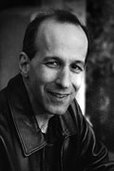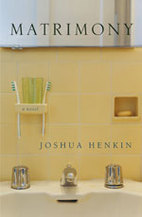 So, yes, I’m late to this party*. I’ve been intending to interview Matrimony author Joshua Henkin on the site for, oh, AGES, and he’s been entirely gracious during an extended period when I’ve been so busy that pretty much all optional commitments have gotten continually pushed aside. But: We finally managed to get the interview done, and talk about all sorts of interesting things–writing workshops, craft and process (of course), recommendations–so I think you’ll agree it was worth the wait. If you’ve somehow missed the book, check out this review in the New York Times by Jennifer Egan. And now, without further ado…
So, yes, I’m late to this party*. I’ve been intending to interview Matrimony author Joshua Henkin on the site for, oh, AGES, and he’s been entirely gracious during an extended period when I’ve been so busy that pretty much all optional commitments have gotten continually pushed aside. But: We finally managed to get the interview done, and talk about all sorts of interesting things–writing workshops, craft and process (of course), recommendations–so I think you’ll agree it was worth the wait. If you’ve somehow missed the book, check out this review in the New York Times by Jennifer Egan. And now, without further ado…
GB: I usually start out by asking people about their work process and how it changes (or doesn’t) between projects? Can you tell me a little about what yours looked like for Matrimony?
JH: Well, it took me ten years to write Matrimony, and I threw out more than three thousand pages, so I sometimes think that my work process should be an object lesson in how not to do things. But actually, the book needed to brew as long as it did. My first novel, Swimming Across the Hudson, is told in first-person and is set over the course of approximately a year, whereas Matrimony is told from more than one point of view and covers about twenty years. So pretty early on I knew this was going to be a more ambitious novel and that I would need to approach it differently. Part of what I was doing was figuring out how to write a novel, since I was trained as a short-story writer, and though Swimming Across the Hudson didn’t literally grow out of a short story, it has the sensibility of a long short story–say, in the same way that Richard Ford’s early novel Wildlife does. So I was learning how to operate on a bigger canvas.
One interesting thing that happened early on was that my computer broke down, and while it was in the shop I was forced to write by hand. This turned out to be a real blessing. I’m an absolutely compulsive rewriter and reviser, and my natural inclination is to revise as I go along–to try, on the sentence level, to make everything perfect before I move on to the next scene. This approach is possible (though perhaps not particularly advisable) when it comes to a short story because with a story you can potentially see the whole in advance. But with a novel, you can’t see the forest for the trees, and you need to just write for a couple of years without really knowing what you’re doing or where you’re going. If you revise too early, it’s like building a house and working on the ornamentation on the doorpost before you’ve laid the foundation. You may end up with a beautiful doorpost, but it doesn’t belong in the house. Well, writing by hand helped me combat my tendency to revise too soon. There’s something about writing on computer that, in my case at least, makes me feel compelled to try to make things beautiful–probably because the words look neat on the screen and so I’m drawn to trying to make them neat in deeper, more important ways. But because my handwriting is so bad I had no illusion looking at the page that what I was writing was anything but rough, and this allowed me to plow forward without looking back. So even when my computer came back from the shop, I continued to write much of the first draft by hand.
GB: There’s a lot I can relate to in your process, especially the write 3,000 pages to get to a novel part. How much did the story evolve over that time–did you end up at all near where you started or was the destination a profound change?
JH: Everything was a profound change–so much so that it’s hard to remember what I started with. I know that when I began I thought the novel would be about a love relationship and that it would take place at a college reunion. Well, it is in part about a love relationship and there is a college reunion in Matrimony, but that reunion doesn’t take place until around page 260 and it lasts for all of six or seven pages. Pretty early on, I realized that the novel was starting in college, and those college years, and especially Julian’s friendship with Carter, are really central to my conception of the book. Matrimony is almost as much about male friendship and male rivalry as it is about love and marriage. Most of the central characters existed in early stages too–with the exception of Mia’s sister, Olivia, who came along a good deal later. But all the characters changed so much over the years that to call them the same characters would be misleading. Those middle sections–Ann Arbor, Berkeley, Iowa City–were pretty late in coming, and the tone of the book changed a lot as well, from a novel that, in its early incarnations, was a good deal more comedic to a novel that, though it certainly has its funny moments, is, at core, a domestic drama. Part of what I was struggling with in terms of tone was how to write about a writer. Writers are told not to write about writers, that doing so is solipsistic and narrow, and so I had this internal voice telling me that the only way to write about a writer was to be arch and ironic, to do it with a wink and a nod. But this wasn’t a wink and nod sort of book, and I was writing away from my strengths. At some point I realized that if Julian were a doctor, a lawyer, a secretary, or a mobster and he took his work seriously, then I would take his work seriously too, and so it should be no different if he was a writer. And as soon as I understood this, the whole tone of the book changed for the better–the writing sections, certainly, but other parts of the book, too.
know that when I began I thought the novel would be about a love relationship and that it would take place at a college reunion. Well, it is in part about a love relationship and there is a college reunion in Matrimony, but that reunion doesn’t take place until around page 260 and it lasts for all of six or seven pages. Pretty early on, I realized that the novel was starting in college, and those college years, and especially Julian’s friendship with Carter, are really central to my conception of the book. Matrimony is almost as much about male friendship and male rivalry as it is about love and marriage. Most of the central characters existed in early stages too–with the exception of Mia’s sister, Olivia, who came along a good deal later. But all the characters changed so much over the years that to call them the same characters would be misleading. Those middle sections–Ann Arbor, Berkeley, Iowa City–were pretty late in coming, and the tone of the book changed a lot as well, from a novel that, in its early incarnations, was a good deal more comedic to a novel that, though it certainly has its funny moments, is, at core, a domestic drama. Part of what I was struggling with in terms of tone was how to write about a writer. Writers are told not to write about writers, that doing so is solipsistic and narrow, and so I had this internal voice telling me that the only way to write about a writer was to be arch and ironic, to do it with a wink and a nod. But this wasn’t a wink and nod sort of book, and I was writing away from my strengths. At some point I realized that if Julian were a doctor, a lawyer, a secretary, or a mobster and he took his work seriously, then I would take his work seriously too, and so it should be no different if he was a writer. And as soon as I understood this, the whole tone of the book changed for the better–the writing sections, certainly, but other parts of the book, too.
GB: Clearly many writers will be drawn to–and recognize–the chronicle of the workshop and also the writing-a-novel-process in the book. I’m assuming that the novel’s not mainly autobiographical (but if it is, okay dish), but how much do your own views of writing and the workshop setting come through in the novel? Or did you have to give those things completely over to these characters, and your own views are substantially different?
JH: A lot of people assume that since I’m a writer writing about a writer, then Matrimony must be autobiographical. But in very deep ways it’s not. In fact, there are really no characters (except for the dog) that are based on actual mammals, and whereas in Swimming Across the Hudson, the parents were quite similar to my own parents, the characters here are very much the product of my imagination. Although, like Julian, I grew up in New York and am a writer, I’m in many ways more similar to Mia, who, like me, is Jewish and the child of an academic–though there are some very big differences between me and Mia too, and not just the obvious one of gender.
In terms of the writing sections specifically, it’s certainly the case that some of Julian’s struggles and insecurities are similar to my own. But there are also important differences. My novel took me years to write, but unlike Julian, I never suffered from writer’s block. I was writing every day; it just took me a long time to get the book right. Around the time Matrimony came out, I published an essay in Poets and Writers called “In Defense of MFA Programs,” and a couple of interviewers asked me how I could write such an essay when Matrimony portrays writing workshops and MFA programs in such a negative light. I think that’s a case of conflating a novel with an argument and a writer with his protagonist. Yes, there are some workshop scenes in Matrimony that don’t cast the writing classroom in the best light, but that doesn’t mean that the novel is trying to indict writing workshops. Novels are best at portraying something specific; they’re not in the business of making generalizations. It’s true that Julian himself is not a big advocate of MFA programs, particularly once he’s gone to Iowa, but he’s not me, and I don’t need to agree with him in order to render him convincingly.
GB: I always like to end interviews by asking people for recommendations–what have you been seeing/reading/listening to lately that you love? Or, failing that, what do you wish more people were aware of that’s been out for awhile?
JH:
Thanks, Josh, for the lovely interview.
*Speaking of which, if you missed Josh’s stint over at The Elegant Variation, it’s worth going back and checking it out. Not everyone makes a good guest blogger.
This is an AMAZING interview. I will be back to review it for sure. Thanks to both of you for doing this.